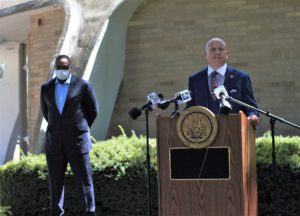By Tom Travis
Pressed at last week’s council meeting by several residents and City Councilperson Monica Galloway (7th Ward) on the city’s response to fight a recent uptick in violent crimes, Mayor Sheldon Neeley reiterated a three-point plan he and former Police Chief Phil Hart laid out in 2020 and steps underway since.
“At no time have we been absent a plan,” Neeley emphasized in the special city council meeting. Neeley’s statement came in response to several residents calling into the meeting demanding “a plan” by the city to fight the uptick in violent crime in Flint.
Flint crime statistics available online
Flint homicides have steadily risen in the last three years. City of Flint statistics report that in 2018 there were 31 homicides, 46 in 2019, and 61 in 2020. Aggravated/felonious assaults have increased from 1,085 in 2018, to 1,373 in 2019, and 1,641 in 2020.
Up-to-date and past crime statistics can be found on the City of Flint’s website here.
Councilperson Galloway asks Mayor Neeley to explain the plan to combat crime
Galloway asked Neeley to explain the plan and suggest what the council can do to support it and how he plans to address the gun violence and deaths in the community.
“We do have a very serious issue. We are trying to protect the health, wealth and safety of our community,” Neeley acknowledged.
Neeley referenced a summer 2020 press conference he and then Hart laid out a plan to fight crime in the city. That same plan carried over with the transition of the new Chief of Police Terence Green in Sept. 2020.
The three-point plan to fight crime laid out in 2020 includes:
— Formation of a Special Investigative Unit
— A recruitment effort to hire new officers, and
— A “no questions asked” gun buy back program.
Neeley added that the city plans to increase officer pay, recruit new officers and continue to get illegal weapons off the streets.

Mayor Neeley introducing Police Chief Terence Green as the new Chief of Police in August 2020. (Photo by Tom Travis)
Noting that “there is a national trend of increased violent crime,” Neeley recalled a time when he was on city council (2005-2014), that Flint Pastor Herbert Hart came to a meeting to address the very same issues of violent crime in Flint.
In 2008 Hart was gunned down in his own front yard, becoming a victim of the violent crime he decried. “Since that time, I’ve been advocating strongly for violence to stop in our city,” Neeley said.
He offered these statistics on the removal of weapons from the streets:
In 2019 Michigan State Police (MSP) collected 250 illegal weapons
In 2020 MSP collected 447 weapons off the streets of Flint, an increase of 197 weapons off the streets.In 2019 the City of Flint Police collected 415 weapons off the streets.
In 2020 the City of Flint Police collected 655 weapons off the streets, an increase of 240 weapons off the streets.
“We want to get guns out of the hands of those who would cause chaos and havoc.” Neeley added, “We have more officers on the street in 2020 than in 2019.”
Later in a follow-up email, Marjory Raymer, City of Flint communications director, stated, “We in general do not disclose the exact number of officers working on a shift.”
Neeley called on the city council, as a “co-equal branch of government” saying that they “must come together and be united” to resolve the issues of violent crime.
“Hot spot areas and crime mapping” – Chief Green
Flint Police Chief Terence Green told the council “we are enforcing in hot spot areas, conducting crime mapping” and “collecting data” on criminal activity. “All our responses are data driven, evidence based, that’s what we’ve done since day one,” Green said.

Flint Chief of Police Terence Green (Photo source: City of Flint website)
Chief Green told the council that, “Ever since I’ve taken office we evaluate weekly and adjust accordingly,” in the fight against crime. Green added that a special group was established to investigate narcotics and prostitution. Chief Green also recounted that he has phone calls with council members each week concerning crime in their wards.
Green added “Flint has 22 MSP troopers that patrol the city of Flint.” And he announced that beginning Monday, Feb. 8, MSP helicopters will begin to make regular patrols over the city.
Chief Green said retaining officers is a problem. He said officer retainment in the FPD is “about five to six years.”
“It is a mixed bag why some officers are leaving for better paying positions,” he said. ” But we are recruiting officers from other departments who want to enjoy a career here at the City of Flint. It’s an issue locating qualified applicants also.”
What can the public do to fight crime? “Call in,” Neeley and Green say
Councilperson Galloway asked Mayor Neeley and Chief Green, “What is the role of the public when they find themselves in a violent neighborhood, woken up by gun fire, what should they do?”
Mayor Neeley and Chief Green both encouraged residents to call in the issue.
“If there is a disturbance of the peace they [residents] should call 911, we should be dispatched to that, we will respond.”
Galloway asked about the FPD response to a particular problem area in her ward to which Chief Green said, “What we can do is have the night shift patrolling the area, initiate traffic stops, and trying to determine the am0ount of crowd size. Make sure they follow the rule of the law.”
Referring to local “house parties” called in by neighboring residents, Chief Green said officers stop by the home and that “nuisance letters” will begin to be sent to these homes.
Galloway challenged Chief Green to increase police visibility in her ward and even do random drive-throughs around the city. “I agree with you 100 percent Councilwoman Galloway,” Green replied. “That’s part of my agenda. We need to increase our visibility. It does deter crime.”

Flint Police vehicle. (Photo by Tom Travis)
Councilperson Maurice Davis (2nd Ward) recalled neighborhood patrol groups, “I remember when neighborhood associations were established several years back. The only way to address crime that I can see is through the community talking. You see something, you say something.”
Davis referred to an effort in Flint started by Flint resident Jalil Carter called “Man Up” program. Davis said, “That’s the community stepping up and addressing how to deal certain type of situations. If the community get involved it will help the whole city of Flint.”
Davis also recalled being a part of neighborhood patrols. He said they had signs and yellow lights to put on their cars as they patroled neighborhood streets.
“We had walkie-talkies and reported to [Deputy Police Chief Devon] Bernritter If we saw someone trying to start a fire and doing something suspicious,” he said. Bernritter’s retirement after 20 years has just been announced.
The public call in to voice concerns
“I’m concerned about my kids just riding their bikes in the neighborhood,” said 1st Ward resident Danielle Brown. Brown complained that liquor stores in her area are still open at 2 a.m. Flint resident Taylor Williams also voiced concern about her children playing in the neighborhood, saying there have been times they have had to lie on the floor of their house because of shooting.
Former president of the Ethics and Accountability Board Pastor Allen Gilbert called in and said, concerning having a plan to fight crime, “If you fail to plan, you plan to fail.”
In the council response and before the Mayor and Chief Green spoke, Councilperson Galloway (7th Ward) quoted former Councilperson Scott Kincaid (9th Ward) saying, “Crime in the City of Flint falls in the lap of the mayor.”
Councilperson Jerri Winfrey-Carter (5th Ward) said, “It’s gonna take the entire community working together. We need to work through this together and get a plan and work the plan.”

5th Ward Councilperson Jerri Winfrey-Carter in a 2019 in-person council meeting. (Photo by Tom Travis)
Lt. Jeffery Short of the Michigan State Police – Flint post was on the line for the meeting. “Our goal is to reduce crime and help take care of any other problems in the city. We use directed patrol, trying to locate crime and prevent crime before it happens,” Short said.
“There is a national uptick in violent crime across the country. Flint is not alone in fighting this battle. I’ve had many many conversations with Chief Green to see what we can do about the crime issues. The issues are not going to be resolved over night. We have to readjust our efforts where necessary,” Short said.
One of the councilpersons asked Mayor Neeley if a mandated curfew would help to curb the crime. Neeley said he would consider that but there was no plan for one. Neeley did remind the council that Mott Community College security force and UM-Flint security assist the FPD when available.
Hiring of deputy chief and additional officers
The FPD is in the process of hiring a new deputy chief with the retirement of Devon Bernritter. Bernritter announced his retirement from the FPD after 20 years. He was promoted from captain to deputy chief in 2017.
Those interested in applying for positions at the FPD can do so at this link.
EVM emailed Chief Green with several follow-up questions and at the time of publication has not heard back from him.
EVM Managing Editor Tom Travis can be reached at tomntravis@gmail.com.


You must be logged in to post a comment.